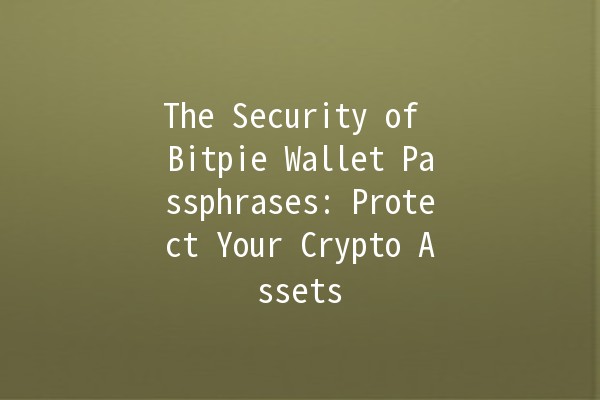
In the world of cryptocurrency, security is paramount. One of the most important aspects of keeping your digital assets safe is understanding the security of your wallet passphrase, especially when using the Bitpie wallet. In this article, we will explore the precautions you should take and practical tips to enhance your passphrase security, ensuring your cryptocurrency remains protected from unauthorized access.
Understanding Passphrases and Their Importance

A passphrase is a sequence of words or characters used for authentication. They serve as the primary line of defense for your wallet, allowing access to your cryptocurrency. Unlike traditional passwords, passphrases can be longer and more complex, making them harder to crack.
Why Are Passphrases Crucial for Bitpie Wallet Security?
Best Practices to Enhance Your Passphrase Security
To ensure the safety of your Bitpie wallet passphrase, follow these five essential tips:
Explanation: A strong passphrase should be a combination of uppercase and lowercase letters, numbers, and symbols. The longer the passphrase, the more secure it is.
Example: Instead of using a simple passphrase like “mywallet123”, opt for something like “T3ch@S3cur!tyC0d3$2023”.
Explanation: Twofactor authentication adds an extra layer of security. Even if someone gets hold of your passphrase, they would still need access to the second factor—usually something only you would have, such as a smartphone app or hardware token.
Example: Use apps like Google Authenticator or Authy, which generate a temporary code every 30 seconds that you need to enter along with your passphrase.
Explanation: Periodically changing your passphrase can help safeguard your wallet against potential breaches.
Example: Set a reminder every three to six months to change your passphrase to something new and unique.
Explanation: Storing your passphrase on your computer or online can make it vulnerable to hackers. Instead, consider using offline methods such as writing it down and storing it in a secure place.
Example: Use a safe or a secure lockbox to store your written passphrase, ensuring that only you have access to it.
Explanation: Phishing scams often target wallet users to steal their passphrases. Always be cautious of any unsolicited communication asking for your passphrase.
Example: If you receive an email or message requesting your passphrase, do not respond. Instead, verify the source through official channels.
Additional Tips for Securely Managing Your Bitpie Wallet
Use Hardware Wallets for Large Amounts
For larger holdings, consider using a hardware wallet that keeps your passphrase offline, providing enhanced security against online threats.
Keep Your Software Updated
Regularly update your Bitpie wallet and any associated software to protect against vulnerabilities that hackers could exploit.
Backup Your Passphrase
Securely back up your passphrase in multiple secure locations. If you lose access to your wallet, having a backup can save your assets.
Educate Yourself About Crypto Security
Stay informed about the latest scams and security practices in the crypto world. Knowledge is power, and being aware can prevent losses.
Monitor Your Accounts Regularly
Regularly check your wallet and account activity. Immediate identification of unauthorized transactions can help mitigate damage.
Common Questions About Bitpie Wallet Passphrase Security
What should I do if I forget my passphrase?
If you forget your passphrase, the recovery of your Bitpie wallet may be impossible unless you have a backup. It’s crucial to keep a secure backup of your passphrase in a safe location.
How can I tell if my wallet has been compromised?
Monitor your account for any unauthorized transactions. Additionally, check for unusual access logs or notifications from your wallet provider.
Is it safe to use my passphrase on public WiFi?
Avoid accessing your wallet or entering your passphrase over public WiFi networks. Use a VPN to protect your connection if you need to access sensitive information.
Can I recover my wallet if I lose my device?
If you lose your device, you can recover your wallet using your backup passphrase or recovery phrase, provided you have access to it.
How do I know if I have a strong passphrase?
A strong passphrase typically contains at least 12 characters and includes a mix of letters, numbers, and symbols. Online tools can help you assess the strength of your passphrase.
What should I do if I suspect phishing?
Immediately change your passphrase and enable 2FA if not already active. Report suspected phishing attempts to your wallet provider and follow security protocols.
Securing your Bitpie wallet passphrase is essential for protecting your cryptocurrency investments. By following the best practices outlined in this article—such as using strong and unique passphrases, enabling twofactor authentication, and being vigilant against phishing—you can safeguard your assets against potential threats. In the everevolving world of cryptocurrency, staying informed and proactive is your best defense against unauthorized access.
By applying these strategies, you can ensure that your crypto assets remain safe, allowing you to enjoy the benefits of this innovative financial technology without fear.

